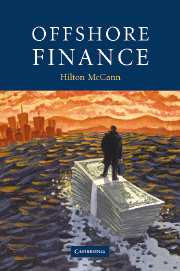Book contents
- Frontmatter
- Contents
- List of figures
- List of tables
- Preface
- List of abbreviations
- PART I The past
- 1 Linkages
- 2 The ‘Offshore’ environment
- 3 The service providers and the consumer (1)
- 4 The service providers and the consumer (2)
- 5 The significance of taxation
- 6 A description of regulatory and supervisory processes
- 7 The regulator and the regulatory authority
- 8 Money laundering
- 9 Some international organisations and groupings
- PART II The present
- PART III The future
- Appendix 1
- Appendix 2
- Index
5 - The significance of taxation
from PART I - The past
Published online by Cambridge University Press: 21 August 2009
- Frontmatter
- Contents
- List of figures
- List of tables
- Preface
- List of abbreviations
- PART I The past
- 1 Linkages
- 2 The ‘Offshore’ environment
- 3 The service providers and the consumer (1)
- 4 The service providers and the consumer (2)
- 5 The significance of taxation
- 6 A description of regulatory and supervisory processes
- 7 The regulator and the regulatory authority
- 8 Money laundering
- 9 Some international organisations and groupings
- PART II The present
- PART III The future
- Appendix 1
- Appendix 2
- Index
Summary
Picking important problems and fixing them is such a beguilingly simple idea, and appealingly non-partisan. Yet it turns out to be such a bugaboo to implement.
Introduction
In the previous chapter, tax and regulation were identified as the two factors that give rise to most debate and criticism about the ‘Offshore’ environment. In fact, they are also amongst the most fundamental factors that give value to operating ‘Offshore’ in the first place. This chapter focuses on tax, and the next chapter discusses regulation.
There is at least one other reason why ‘Offshore’ plays such a significant role in world commerce – and that is in respect of asset protection. In the widest sense, asset protection reduces to keeping what one owns. In respect of some countries, the only way to protect assets is to remove them from the jurisdiction – whether to prevent them from being seized or consumed by punitive tax rates. Where seizure or sequestration is possible or probable, the owner will take steps to move those assets elsewhere. Further, in some jurisdictions, wealthy individuals are well known and may be subject to kidnapping. This includes family members. In such circumstances, the owner of the assets might consider that the only way to protect the assets is to make them less open to public scrutiny.
Professional people often use ‘foreign grantor trusts’ – also known as the ‘asset protection trust’ (APT) – to transfer ownership of assets elsewhere (frequently ‘Offshore’), thereby protecting those assets from litigation ‘Onshore’.
- Type
- Chapter
- Information
- Offshore Finance , pp. 82 - 115Publisher: Cambridge University PressPrint publication year: 2006



